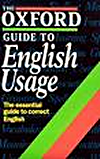

| Book of the Month | ||
 |
The Oxford guide to English Usage |  |
Publisher: Oxford University Press
Editors: Edmund Weiner & Andrew Delahunty
US$15.00
ISBN 0-19-280024-8
This little book claims to cover all the essential points of spoken and written English. And it is not only a useful guide for students of English as a foreign language. As many schools in Britain basically abandoned teaching the fundamentals of the English language for a whole generation, there are many native speakers who also need an authoratative guide to English spelling, pronunciation and grammar. A book of this size cannot pretend to cover the entire range of English, and the editors say that they have particularly concentrated on words or grammar that cause English users difficulty. Many students will appreciate the reminder that words like 'honour' and 'hour' have a silent 'h', but very few people need some of the more esoteric information in this book such as the fact that the 'gm' of 'apophthegm' has a silent 'g'.
The book has 306 pages, and no illustrations. The layout is of rather dense text, with plentiful use of italics and bold print to make the explanations clearer. The writers are rather proud of the fact that many of their examples are quotations from famous authors such as George Orwell and Virginia Woolf. However, while this does make the book somewhat more interesting, it does make some of the examples unnecessarily complicated. The book has four main parts, starting with Word Formation which tells you, for example, how nouns are formed from verbs, and verbs from nouns. Then come Pronunciation and Vocabulary (which concentrates on confusing words such as the difference between 'parricide' - the killing of a close relative, and 'patricide' - the killing of a father.) Then comes grammar, which again concentrates on odd usages and exceptions to the general rule, such as adverbs which do not end in 'ly'. Finally there are three appendices, including one on English Overseas which could easily be expanded into an entire book.
Who is this book for? This is a question the editors do not seem to be able to answer. Some of the information is so basic that most intermediate students will know it already, and other details are so exotic that one may need to know and use them once in a lifetime. Perhaps the best use is as a handy reference for an advanced student who needs to look up a rule or a difficult word while wrting an essay or other text, but there are better books for this; such as Swan's excellent Practical English Usage
Verdict: Tries to do too much in 306 pages
Assessment 6/10